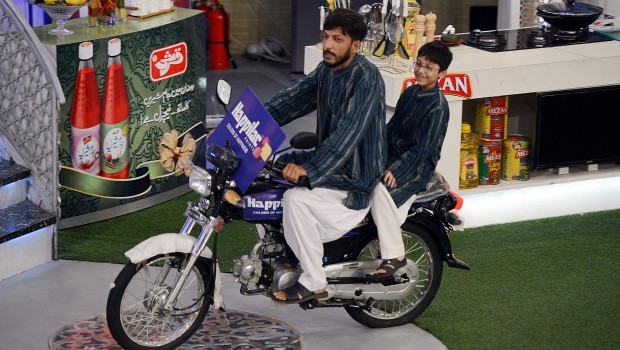
In this photograph taken on July 31, 2013, a Pakistani Muslim man rides on a motorbike which he won on an Islamic quiz show Aman Ramadan in Karachi. In the battle for TV ratings, Pakistan’s top channels are making money out of Ramadan by broadcasting round-the-clock chat shows mixing prizes, charity and prayer. (AFP PHOTO/ASIF HASSAN)
No matter which TV channel you switch on, you will find colorful programs and popular singers, actors and sportsmen relating their experience of fasting. One such celebrity, Javed Sheikh, is famous television star generally known for his glamorous lifestyle. On another channel, Pakistan’s leading stand-up comedian, Omar Sharif, gives interview about how he and his family prepare for the month of Ramadan.
Another popular program format involves discussion of Pakistan’s societal problems, usually between religious scholars and laypeople. In one program, hosted inside Karachi’s largest hall, a group of religious scholars criticized the way poorer Pakistanis sometimes leave newborn daughters on the doorsteps of orphanages. Just across the tables—set neatly with tablecloths and laden with food—sits a group of young girls who were raised in orphanage in Karachi and many other ordinary people.
Famous TV anchor Amir Liaquat Hussein moderated that discussion, which was broadcast live on GEO TV in the twenty minutes before iftar, the Ramadan fast-breaking meal. The discussion was part of the live Ramadan transmission of GEO television, which begins eight hours before iftar and during suhoor, the meal eaten before Ramadan fasting begins at dawn, every day of the holy month.
But perhaps the most popular programming involves a mix of populism and glamor. In these innovative chat shows, Pakistani television producers have shrewdly married the concerns of lower- and middle-classes with easy Islamic trivia questions and expensive prizes. High-tech gadgets like expensive cellphones, LCD TVs, and microwaves seem to be the most popular this year.
Despite the onslaught of TV commercials depicting an upper-middle class lifestyles and entertainment programs about jet-setting celebrities and their red carpet lifestyles, most people in Pakistan cannot afford such luxuries. It is little wonder, then, that such Ramadan programming has been a big hit. A public opinion poll company in Islamabad recently published a report saying that the collective viewership of Ramadan talk shows has exceeded more than 3.5 million people.
Along with the expensive prizes come elaborate sets, private television channels are spending millions of rupees on expensive set designs. Two years ago Pakistan’s largest TV channel, GEO TV, began setting up a complete Ramadan city in Karachi each year to use as a base for their Ramadan programming. This year, every channel in Pakistan has built its own Ramadan city.
Take, for example, Aamir Liaquat Hussein’s Ramadan city. On the set itself is a gigantic reconstruction of Noah’s Ark, built especially for the holy month. “I cannot determine the type of material used to create it. The ark could probably have created using cheap wood or Formica and then painted. If I made a guess, it cost PAK 50,000,” says Maleeha Hameeda Siddique, a media expert and assistant editor of the Herald monthly news magazine in Karachi. In addition, exotic animals—peacocks, deer, turtles, and so on—have been added to the ark.
Despite their popularity, these shows are not without controversy. Aamir Liaquat Hussein was the minister of religious affairs in former president Pervez Musharraf’s government. He joined GEO television a few days before Ramadan to launch a special broadcast live from his specially constructed Ramadan set.
Another example of the controversy is the famous female actor Maya Khan. Last year, she was the subject of scathing criticism when she went up to young couples sitting on Pakistan’s beaches and demanded to see their marriage certificates on live television. Forced to resign from that show, which was broadcast by Samma TV, she is back this Ramadan with a live talk show on Express News TV.
Regardless of the controversy, the special Ramadan programming will doubtlessly remain highly popular. “The public have taken a severe hit from the high inflation, resulting in increased poverty and unemployment hitting an all-time high. You can’t blame them for appreciating Amir Liaquat and Maya Khan if through these hosts and their Ramzan [Ramadan] shows they get cash, rickshaws, motorbikes, cars, education for their daughters, or money to pay for the treatment of their ill spouses,” says Siddique. “They have hit the jackpot by bringing back these hosts who, like it or not, are extremely admired by the masses.”
